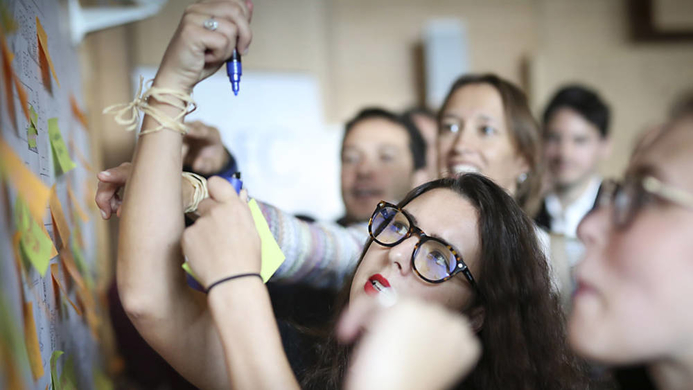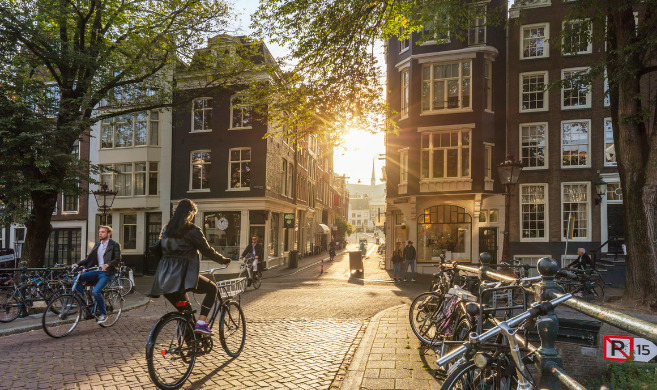Climate change is not just a concern for tree-hugging environmentalists; it affects the price and availability of raw materials. For example, “a drought in New Zealand will affect a cow's diet in the meadow, which may impact milk quality, thus causing a shortage on the market of high-quality milk, which in turn will have an impact on global pricing,” says Carolin Schmidt, a global buyer of dairy ingredients for Danone. Her ambition when she started at Danone was to join the milk team, because it is at the very core of the business and at the same time faces significant sustainability issues, such as climate change, greenhouse gas emissions, and fair work for farmers. Carolin Schmidt is also a graduate of HEC's MSc in Sustainability and Social Innovation (SASI), and her pragmatic mindset – keen to address sustainability issues, but from the business side – is very typical of the kind of students attracted to the program: strategists and entrepreneurs, with a cause. The ambition of HEC's one-year SASI program is to train future change-makers and leaders to acquire a global vision of sustainable management in order to lead the transformation of corporate strategies and build a resilient economy through innovative models.
“Entrepreneurs with a cause”
But why offer a degree specifically geared towards sustainability? Jeremy Ghez, the program's academic director, believes that students could potentially have found an interest in classic strategy or entrepreneurship master's, but that such degrees alone would not have been enough. “There is a population dissatisfied with the current consensus and looking to dream more, they're willing to shake the coconut tree,” he says. But he adds that those who will “really make an impact” are the students he calls “realistic idealists”: “When you are a dreamer but do not overlook market forces, you have a strategic edge over your competitors.” And “impact” is indeed the key word here, the one that systematically turns up in interviews with applicants, points out Lise Penillard, SASI's executive director: “They are passionate about having an impact on the environment or on social issues.” Besides that passion, what the directors look out for during the selection process is an ability for complex, critical, independent thinking, as well as the potential to be an empathic leader, who inspires and empowers. “We also look at what they have achieved,” says Lise Penillard, citing the example of a young Indian engineer who cycled 7,500 km across his country on an electric bicycle and interacted with 10,000 people throughout the journey to raise awareness about renewable energy before starting the master's. Some 300 people apply for the course; 54 were selected this year, representing 27 different nationalities from the five continents, and a diversity of backgrounds, from business and engineering to social sciences.
“Real-life” projects and personal development
Like many of HEC's master's degrees, SASI is taught (almost) exclusively in English. Core courses include Strategy and Sustainable Development, Sustainable Operations & Supply Chains, Responsible Investing, Sustainable Cities; electives include Geopolitics of Resources, Impact Entrepreneurship, NGO Management... The program fits in well with HEC's Society and Organization (SnO) Center, whose members research and teach about contemporary social and environmental issues.
For example, Rodolphe Durand, the academic director of the SnO Center, teaches the “Have a cause, Make an Impact” course, and some of the SASI students' projects feed research at SnO. The program is also an opportunity for students to work on “real-life” consulting projects for companies or NGOs, or to develop their own start-up. “It was an intense program packed with seminars and project work and you learn to become somehow a specialized generalist for sustainability,” recalls Carolin Schmidt, who says practicing quickly processing a lot of information still serves her every day in her job. A special feature of the program is its emphasis on personal development: “In change-maker seminars, students learn to better know themselves and clarify their goals”, explains Lise Penillard. Every year, they also undertake field trips to developing countries to meet with business leaders and NGOs. “The idea is to challenge in the field what you learn in a French business school,” says the executive director. Previous destinations include Botswana – an African success story – and Cuba, she says was “a paradigm change”, with its closed, state-dominated economy.
Changing business from within
Another way in which the program departs from a perhaps more classic “entrepreneur” perspective is in its “intrapreneurship” track. While business school graduates are often expected to go on to create their own business, the idea here is to go back to big corporations and change things from within. “Do you need to start a revolution to make an impact?” asks Jeremy Ghez. “No, you can also piggyback on the existing and incrementally change things from within.” The intrapreneurship track does include a course called “critics of CSR” [corporate social responsibility], which encourages students to think critically about the potential “dark side of CSR and sustainability strategies”, or social- and green-washing, says Lise Penillard. But she believes that the corporate world is ready to truly embrace sustainability, to anticipate changes rather than be passively subjected to them. “Over the years sustainability has become integrated into corporate strategy and discussed in executive committees,” she says. Some major firms sponsor a number of certificates, for example Danone, Renault and Schneider Electric sponsor the Social Business certificate and Societe Generale and Deloitte the Energy & Finance Certificate. Of course, the close interaction with the corporate world builds bridges that help graduates find jobs: the program has a 93% employment rate within 3 months of graduation, and an average starting salary of €49K.






